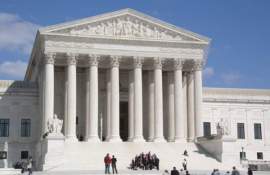
Louisville & Nashville Railroad Co. v. Mottley

Louisville & Nashville Railroad Co. v. Mottley
Some Supreme Court cases are primarily remembered due to their fact pattern and the ruling on controversial subject matter. However, in the case of Louisville & Nashville Railroad Co. v. Mottley, the case is remembered because of a ruling made about federal versus state jurisdiction.
Mottley's Train Passes
The Mottleys were a married couple who were both involved in a train accident that injured them. They sued the railroad in a personal injury action, and as part of their settlement, the railroad agreed to give them passes for free transportation for life. The Mottleys made use of their passes, which required annual renewal, for 36 years. In 1907, when they attempted to renew their passes for the 37th time, they were informed that the passes could not be renewed due to a recently passed act of Congress.
Because the terms of the settlement didn't allow for the passes to be discontinued for any reason, the Mottleys began a court case that would become Louisville & Nashville Railroad Co. v. Mottley by the time it got to the Supreme Court level.
The Act of Congress
Congress had actually taken steps in 1906 to ban all forms of permanent free transportation passes. While this may seem at first glance like an odd step for Congress to take, the reason for it was based in corrupt practices occurring at the time. Lobbyists were bribing Congressional representatives with free transportation passes in exchange for votes on key issues. In order to stop this corrupt practice, Congress simply banned the passes—which, of course, also stopped people like the Mottleys from getting their free transportation.
District Court Trial
While the Mottleys could have addressed their case in state courts in Kentucky, they chose instead to file in federal court. Because both parties were located in Kentucky, diversity jurisdiction—in which federal courts have jurisdiction in order to adjudicate a dispute between parties in two different state jurisdictions—could not apply. In order to satisfy jurisdictional requirements, the Mottleys' attorney suggested that the railroad would bring a constitutional question up as part of its defense. This would satisfy the requirement for subject matter jurisdiction, so the Mottleys believed federal court was the correct venue for their case.
The district court decided for Mottley, but the railroad immediately appealed and the case of Louisville & Nashville Railroad Co. v. Mottley was heard by the U.S. Supreme Court.
Supreme Court Decision
The Supreme Court, before it would even examine the case on its merits, made a decision against Mottley immediately. It said in Louisville & Nashville Railroad Co. v. Mottley that there was no subject matter jurisdiction, because the fact that a constitutional question could potentially be raised isn't enough to show that subject matter jurisdiction exists. Instead, the court found that this was a state matter of contract law that ought to be decided in state courts of Kentucky.
The Supreme Court dismissed the case, and remanded it to the federal district court, with instructions for the district court to dismiss the case from the federal court system entirely.



















